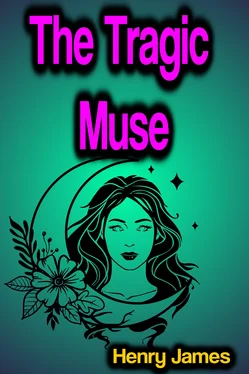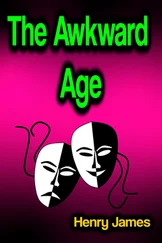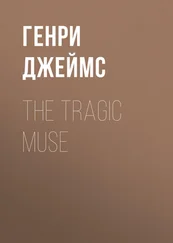Henry James - The Tragic Muse
Здесь есть возможность читать онлайн «Henry James - The Tragic Muse» — ознакомительный отрывок электронной книги совершенно бесплатно, а после прочтения отрывка купить полную версию. В некоторых случаях можно слушать аудио, скачать через торрент в формате fb2 и присутствует краткое содержание. Жанр: unrecognised, на английском языке. Описание произведения, (предисловие) а так же отзывы посетителей доступны на портале библиотеки ЛибКат.
- Название:The Tragic Muse
- Автор:
- Жанр:
- Год:неизвестен
- ISBN:нет данных
- Рейтинг книги:5 / 5. Голосов: 1
-
Избранное:Добавить в избранное
- Отзывы:
-
Ваша оценка:
- 100
- 1
- 2
- 3
- 4
- 5
The Tragic Muse: краткое содержание, описание и аннотация
Предлагаем к чтению аннотацию, описание, краткое содержание или предисловие (зависит от того, что написал сам автор книги «The Tragic Muse»). Если вы не нашли необходимую информацию о книге — напишите в комментариях, мы постараемся отыскать её.
The Tragic Muse — читать онлайн ознакомительный отрывок
Ниже представлен текст книги, разбитый по страницам. Система сохранения места последней прочитанной страницы, позволяет с удобством читать онлайн бесплатно книгу «The Tragic Muse», без необходимости каждый раз заново искать на чём Вы остановились. Поставьте закладку, и сможете в любой момент перейти на страницу, на которой закончили чтение.
Интервал:
Закладка:
At the hotel in the Rue de Rivoli she had the disappointment of finding that Mrs. Dallow had not called, and also that no telegrams had come. She went in with the girls for half an hour and then straggled out with them again. She was undetermined and dissatisfied and the afternoon was rather a problem; of the kind, moreover, that she disliked most and was least accustomed to: not a choice between different things to do—her life had been full of that—but a want of anything to do at all. Nick had said to her before they separated: "You can knock about with the girls, you know; everything's amusing here." That was easily said while he sauntered and gossiped with Peter Sherringham and perhaps went to see more pictures like those in the Salon. He was usually, on such occasions, very good-natured about spending his time with them; but this episode had taken altogether a perverse, profane form. She had no desire whatever to knock about and was far from finding everything in Paris amusing. She had no aptitude for aimlessness, and moreover thought it vulgar. If she had found Julia's card at the hotel—the sign of a hope of catching them just as they came back from the Salon—she would have made a second attempt to see her before the evening; but now certainly they would leave her alone. Lady Agnes wandered joylessly with the girls in the Palais Royal and the Rue de Richelieu, and emerged upon the Boulevard, where they continued their frugal prowl, as Biddy rather irritatingly called it. They went into five shops to buy a hat for Biddy, and her ladyship's presumptions of cheapness were woefully belied.
"Who in the world's your comic friend?" Peter Sherringham was meanwhile asking of his kinsman as they walked together.
"Ah there's something else you lost by going to Cambridge—you lost Gabriel Nash!"
"He sounds like an Elizabethan dramatist," Sherringham said. "But I haven't lost him, since it appears now I shan't be able to have you without him."
"Oh, as for that, wait a little. I'm going to try him again, but I don't know how he wears. What I mean is that you've probably lost his freshness, which was the great thing. I rather fear he's becoming conventional, or at any rate serious."
"Bless me, do you call that serious?"
"He used to be so gay. He had a real genius for playing with ideas. He was a wonderful talker."
"It seems to me he does very well now," said Peter Sherringham.
"Oh this is nothing. He had great flights of old, very great flights; one saw him rise and rise and turn somersaults in the blue—one wondered how far he could go. He's very intelligent, and I should think it might be interesting to find out what it is that prevents the whole man from being as good as his parts. I mean in case he isn't so good."
"I see you more than suspect that. Mayn't it be simply that he's too great an ass?"
"That would be the whole—I shall see in time—but it certainly isn't one of the parts. It may be the effect, but it isn't the cause, and it's for the cause I claim an interest. Do you think him an ass for what he said about the theatre—his pronouncing it a coarse art?"
"To differ from you about him that reason would do," said Sherringham. "The only bad one would be one that shouldn't preserve our difference. You needn't tell me you agree with him, for frankly I don't care."
"Then your passion still burns?" Nick Dormer asked.
"My passion—?"
"I don't mean for any individual exponent of the equivocal art: mark the guilty conscience, mark the rising blush, mark the confusion of mind! I mean the old sign one knew you best by; your permanent stall at the Français, your inveterate attendance at premières, the way you 'follow' the young talents and the old."
"Yes, it's still my little hobby, my little folly if you like," Sherringham said. "I don't find I get tired of it. What will you have? Strong predilections are rather a blessing; they're simplifying. I'm fond of representation—the representation of life: I like it better, I think, than the real thing. You like it too, you'd be ready in other conditions to go in for it, in your way—so you've no right to cast the stone. You like it best done by one vehicle and I by another; and our preference on either side has a deep root in us. There's a fascination to me in the way the actor does it, when his talent—ah he must have that!—has been highly trained. Ah it must be that! The things he can do in this effort at representation, with the dramatist to back him, seem to me innumerable—he can carry it to a point!—and I take great pleasure in observing them, in recognising and comparing them. It's an amusement like another—I don't pretend to call it by any exalted name, but in this vale of friction it will serve. One can lose one's self in it, and it has the recommendation—in common, I suppose, with the study of the other arts—that the further you go in it the more you find. So I go rather far, if you will. But is it the principal sign one knows me by?" Peter abruptly asked.
"Don't be ashamed of it," Nick returned—"else it will be ashamed of you. I ought to discriminate. You're distinguished among my friends and relations by your character of rising young diplomatist; but you know I always want the final touch to the picture, the last fruit of analysis. Therefore I make out that you're conspicuous among rising young diplomatists for the infatuation you describe in such pretty terms."
"You evidently believe it will prevent my ever rising very high. But pastime for pastime is it any idler than yours?"
"Than mine?"
"Why you've half-a-dozen while I only allow myself the luxury of one. For the theatre's my sole vice, really. Is this more wanton, say, than to devote weeks to the consideration of the particular way in which your friend Mr. Nash may be most intensely a twaddler and a bore? That's not my ideal of choice recreation, but I'd undertake to satisfy you about him sooner. You're a young statesman—who happens to be an en disponibilité for the moment—but you spend not a little of your time in besmearing canvas with bright-coloured pigments. The idea of representation fascinates you, but in your case it's representation in oils—or do you practise water-colours and pastel too? You even go much further than I, for I study my art of predilection only in the works of others. I don't aspire to leave works of my own. You're a painter, possibly a great one; but I'm not an actor." Nick Dormer declared he would certainly become one—he was so well on the way to it; and Sherringham, without heeding this charge, went on: "Let me add that, considering you are a painter, your portrait of the complicated Nash is lamentably dim."
"He's not at all complicated; he's only too simple to give an account of. Most people have a lot of attributes and appendages that dress them up and superscribe them, and what I like Gabriel for is that he hasn't any at all. It makes him, it keeps him, so refreshingly cool."
"By Jove, you match him there! Isn't it an appendage and an attribute to escape kicking? How does he manage that?" Sherringham asked.
"I haven't the least idea—I don't know that he doesn't rouse the kicking impulse. Besides, he can kick back and I don't think any one has ever seen him duck or dodge. His means, his profession, his belongings have never anything to do with the question. He doesn't shade off into other people; he's as neat as an outline cut out of paper with scissors. I like him, therefore, because in dealing with him you know what you've got hold of. With most men you don't: to pick the flower you must break off the whole dusty, thorny, worldly branch; you find you're taking up in your grasp all sorts of other people and things, dangling accidents and conditions. Poor Nash has none of those encumbrances: he's the solitary-fragrant blossom."
"My dear fellow, you'd be better for a little of the same pruning!" Sherringham retorted; and the young men continued their walk and their gossip, jerking each other this way and that, punching each other here and there, with an amicable roughness consequent on their having, been boys together. Intimacy had reigned of old between the little Sherringhams and the little Dormers, united in the country by ease of neighbouring and by the fact that there was first cousinship, not neglected, among the parents, Lady Agnes standing in this plastic relation to Lady Windrush, the mother of Peter and Julia as well as of other daughters and of a maturer youth who was to inherit, and who since then had inherited, the ancient barony. Many things had altered later on, but not the good reasons for not explaining. One of our young men had gone to Eton and the other to Harrow—the scattered school on the hill was the tradition of the Dormers—and the divergence had rather taken its course in university years. Bricket, however, had remained accessible to Windrush, and Windrush to Bricket, to which estate Percival Dormer had now succeeded, terminating the interchange a trifle rudely by letting out that pleasant white house in the midlands—its expropriated inhabitants, Lady Agnes and her daughters, adored it—to an American reputed rich, who in the first flush of his sense of contrasts considered that for twelve hundred a year he got it at a bargain. Bricket had come to the late Sir Nicholas from his elder brother, dying wifeless and childless. The new baronet, so different from his father—though recalling at some points the uncle after whom he had been named—that Nick had to make it up by cultivating conformity, roamed about the world, taking shots which excited the enthusiasm of society, when society heard of them, at the few legitimate creatures of the chase the British rifle had up to that time spared. Lady Agnes meanwhile settled with her girls in a gabled, latticed house in a mentionable quarter, though it still required a little explaining, of the temperate zone of London. It was not into her lap, poor woman, that the revenues of Bricket were poured. There was no dower-house attached to that moderate property, and the allowance with which the estate was charged on her ladyship's behalf was not an incitement to grandeur.
Читать дальшеИнтервал:
Закладка:
Похожие книги на «The Tragic Muse»
Представляем Вашему вниманию похожие книги на «The Tragic Muse» списком для выбора. Мы отобрали схожую по названию и смыслу литературу в надежде предоставить читателям больше вариантов отыскать новые, интересные, ещё непрочитанные произведения.
Обсуждение, отзывы о книге «The Tragic Muse» и просто собственные мнения читателей. Оставьте ваши комментарии, напишите, что Вы думаете о произведении, его смысле или главных героях. Укажите что конкретно понравилось, а что нет, и почему Вы так считаете.












